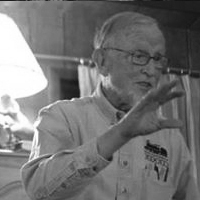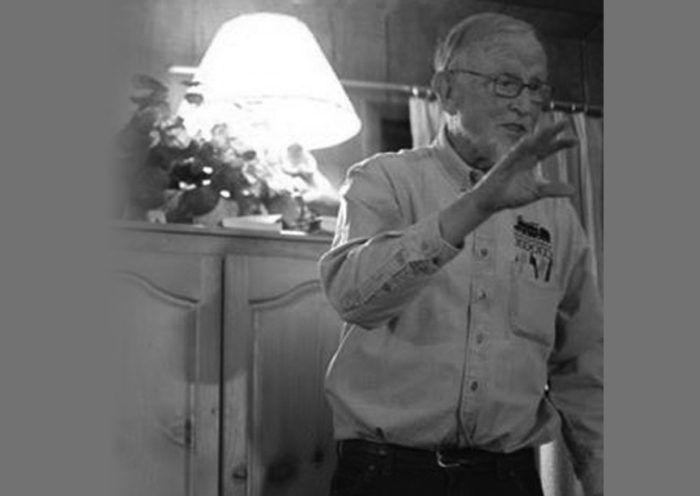Little Nell Answers the Bell
by James R. Kincaid
“It is not the death of Little Nell, but the life of Little Nell, that I object to.”
—K. Chesteron
“You realize, Nell, this Ohio Valley League we’re in is about as tough as they come. You realize that?”
“I do, Coach.”
“’Ohio Valley’ sounds cozy, I know, like a mother’s arms, but it’s more like a brass-knuckles free-for-all when it’s football we’re talking about.”
“Uh-huh.”
“You realize that?”
“I do, Coach.”
“This isn’t the military, Nell; you can loosen up. I want to get to know you a little, understand what’s driving you.”
“You mean what bats are flying in my belfry. Why would a sane female want to play football?”
“I don’t mean to say you’re crazy.”
“What is it you want to know?”
“Why do you want to join the team?”
“Because it’s there.”
“Not bad. OK, then, next question: why do they call you ‘Little Nell’ at home? I assume they do since I heard your brother yell that at you a couple of times in class.”
“That important to my football career?”
“Absolutely central.”
“I was named for my grandmother seven generations back, part of a string of Nell’s, all connected to Dickens’ famous—or was then—Little Nell.”
“I see.”
“Really? You know about that?”
“Oh yeah, most famous child death in the century—fictional child death, I mean. People crowded the New York docks as the packet ships came over carrying the latest serial part of The Old Curiosity Shop, calling out ‘Is Nell dead?’ Almost as if readers couldn’t wait for her to croak. 1840, around in there?”
“I’ll be damned.”
“Language, Nell!”
“Sorry.”
“That’s OK. Didn’t think I’d know that, did you. Took a lot of English classes in college, but I also Googled some stuff last night. It sounded familiar, Little Nell, and there it was, all official and scholarly on Wikipedia. Nell Trent, your name and hers.”
“And it’s been the name of all my Trent grandmas, Nell has. Pretty goddamned corny.”
“Well, anyhow, foul mouth, tell me about football, which I don’t remember reading about in Dickens.”
“I’m fast on my feet, quick to learn, tough. I can be the best running back you ever had.”
“Running back, huh?”
“You were expecting place-kicker, water-girl?”
“Maybe. God, Nell, running back! It’s not just open-field, you know, little of it is. You go through the line, you block, you get the shit kicked out of you. Not like you’re hefty, not at all.”
“Put me in coach!”
“Yeah, that John Fogarty song. But it’s about baseball, where you’d not end up in seventeen different hospitals. Look, Nell, I’m entirely open to you trying out, joining the squad. But let’s be reasonable.”
“Just give me a chance, coach. Don’t decide yet.”
What could he do but agree?
The physical arrangements—dressing area, showers, uniform, attitudes of the other players—were simple, simple, at least, compared to letting this little girl (and little she was) be a running back, participate in even one play at that position. But how could he let her on the squad as a running back and not let her run a play from the backfield? He could tell the boys on defense not to hit her hard, not to hit her at all, but word might get back to Nell, or the Title 9 people, or his own conscience.
So———————–
“You all know Nell Trent, I expect. Here she is, anyhow, and we’re going to go through the playbook, Section 4-A and -B, with Nell at tailback. She knows the plays, I think, and the rest of you idiots sure as hell should. You’d better, as we have our first game in eight days. OK, go get ‘em. Defense, get ready.”
Section 4-A was safe enough, he figured: passing plays where the tailback had sideline routes and some option runs, two to her, but even these allowing her to scoot wide and get her little tail out of bounds.
4-B was another matter: off-tackle plays, a pitch-out that turned inside, some brutal blocking assignments. Holy Hell!
But then it happened. This kid, this Charles Dickens freak, not only could run routes faster than hell, she could somehow snake through the line and even block like nobody’s business, throwing herself at the ankles of boys double her size, getting herself upright in time to throw a second block.
No sign she was getting tired or, more important, mutilated. More likely she’d cause serious injuries than sustain one.
Nell was the only one on the field not surprised by the way things were working out. If anything, she was pissed at herself, disappointed in not shining more brightly, kicking ass more resoundingly.
* * *
The first game went well enough. Nell played maybe a third of the plays on offense, Coach not entirely trusting what he’d seen in the practices, practices where Nell offered nothing but consistent evidence of being the best tailback in the conference – in any conference.
Still, he wanted to be cautious and limit the damage, if damage there were to be. What damage there was, however, was all to the other team. Nell not only scored a touchdown on a long run but managed to clear the way for a teammate to score another, caught two passes and completed another on an option. Nobody on the field was playing at her level.
What choice did he have?
Nell, meanwhile, wasn’t exactly patient, willing to bide her time. She understood well enough what the coach was doing and thinking, but it made her furious that he’d be such a candy-ass. Smart enough, though, not to claw at him directly, she let loose on the kid she was getting used to bumping against in the huddle, the big and ungifted fullback. She knew him mostly by way of his ass, which she followed into the line on straight-ahead plays. He wasn’t fast enough to block defenders on outside plays; the problem was keeping him from getting in the way of the ball carrier, her own self.
“That shit, that miserable shit!” she explained to DeCastro, the fullback in question.
He didn’t pretend to misunderstand: “Yep. Coach sucks.”
“He does that again next game, I’ll. . . .”
“Want me to talk to him?”
She was so stunned so forgot to abuse him: “Would you do that?”
“Sure. Why not?”
“Damn, that’s so nice of you – but no. It’d seem like I didn’t have the balls to confront him myself.”
“OK.”
“You like football, De Castro?” She had no idea why she was getting personal, as this blub was the last person she’d want to do that with, assuming she wanted to do it with anybody.
“No.”
“Why you here?”
“My dad. Real boys play football, you know, like they also spit and cuss and fondle their balls.”
“You do all those things?”
“No.”
“Damn.”
“I’m lost out here, Nell.”
“On the field?”
“Yeah, on the field. At school. Everywhere.”
“Can I help?”
“Sure. You’re the one who can.”
BIO
 James R. Kincaid has published about forty stories and some novels: A History of the African-American People by Strom Thurmond (co-authored with Percival Everett), Lost, You Must Remember This, Wendell and Tyler (a new adult trilogy), Just Wally and Me, and Chasing Nightmares, along with a collection of short stories and a play, “The Court-Martial of Lt. Calley.” He has taught at Ohio State, Colorado, Berkeley, Southern Cal, and is now at Pitt.
James R. Kincaid has published about forty stories and some novels: A History of the African-American People by Strom Thurmond (co-authored with Percival Everett), Lost, You Must Remember This, Wendell and Tyler (a new adult trilogy), Just Wally and Me, and Chasing Nightmares, along with a collection of short stories and a play, “The Court-Martial of Lt. Calley.” He has taught at Ohio State, Colorado, Berkeley, Southern Cal, and is now at Pitt.


















